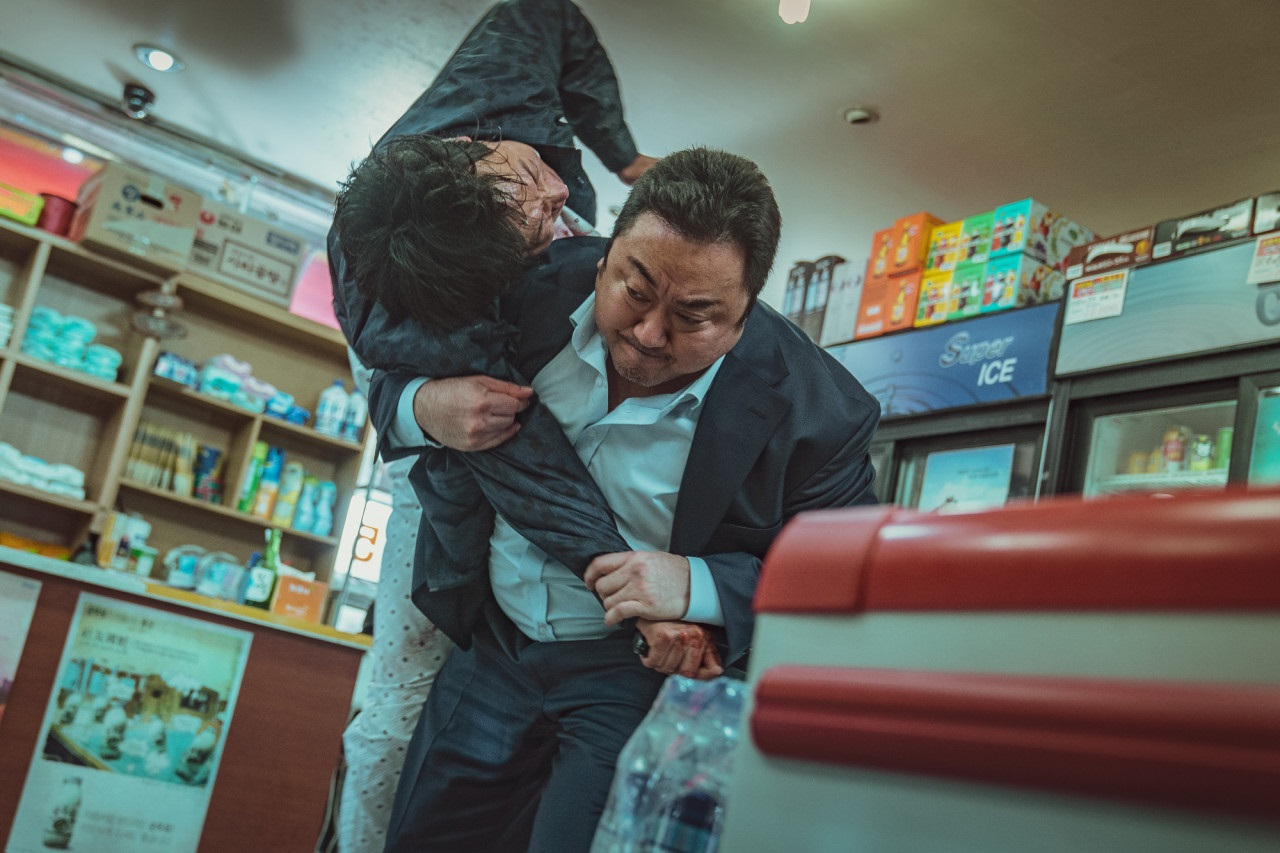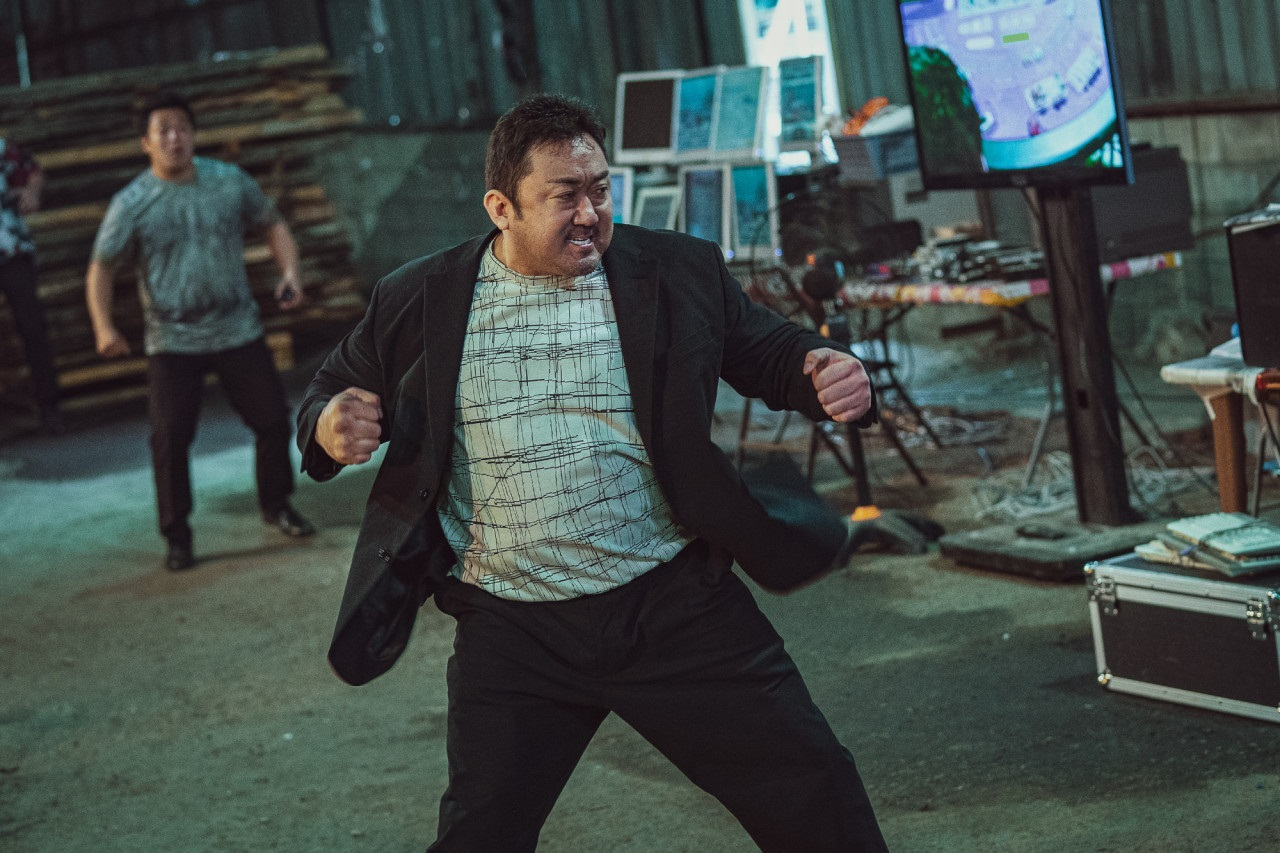From ‘Eternals’ to ‘Roundup,’ Don Lee dons a unique identity
By Yoon Min-sikPublished : May 19, 2022 - 15:41
“Ma Dong-seok is his own genre.”
Korean moviegoers often say this in reference to the Korean-American movie star, also known as Don Lee, in recognition of his unique screen presence and charisma.
A recent survey by online research firm PMI on Koreans aged 20-60 asked what word comes to mind when hearing his name. The answers were in the order of: “muscular/huge,” “tough/strong,” “Mavely (a combination of “Ma” and “lovely”),” “gangster, “The Outlaw (2017 movie)” and “police violent crimes bureau.”
As evidenced by the affectionate nickname “Mavely,” Lee’s image in the cinematic world is more than just “burly and strong.” He comes across as humane, mature and warm-hearted in his roles. His reputation in Korea is somewhat comparable to that of Hollywood strongmen like Dwayne -- formerly “The Rock” -- Johnson or Arnold Schwarzenegger.
What type of typecast actor is Lee?
A late bloomer who picked up acting in his 30s, Lee’s film career spans across two decades. His roles are typically of big, foul-mouthed middle-aged men who look frightening but are warm-hearted on the inside.
This is most apparent in the beastly but righteous cop Ma Seok-do from “The Outlaw”, a role Lee reprises in the movie’s sequel “Roundup” that opened Wednesday. The role is so much like Lee that it almost seems like he is playing himself. The director himself admitted that the character’s name is a sort of anagram of Lee’s stage name, Ma Dong-seok.
Korean moviegoers often say this in reference to the Korean-American movie star, also known as Don Lee, in recognition of his unique screen presence and charisma.
A recent survey by online research firm PMI on Koreans aged 20-60 asked what word comes to mind when hearing his name. The answers were in the order of: “muscular/huge,” “tough/strong,” “Mavely (a combination of “Ma” and “lovely”),” “gangster, “The Outlaw (2017 movie)” and “police violent crimes bureau.”
As evidenced by the affectionate nickname “Mavely,” Lee’s image in the cinematic world is more than just “burly and strong.” He comes across as humane, mature and warm-hearted in his roles. His reputation in Korea is somewhat comparable to that of Hollywood strongmen like Dwayne -- formerly “The Rock” -- Johnson or Arnold Schwarzenegger.
What type of typecast actor is Lee?
A late bloomer who picked up acting in his 30s, Lee’s film career spans across two decades. His roles are typically of big, foul-mouthed middle-aged men who look frightening but are warm-hearted on the inside.
This is most apparent in the beastly but righteous cop Ma Seok-do from “The Outlaw”, a role Lee reprises in the movie’s sequel “Roundup” that opened Wednesday. The role is so much like Lee that it almost seems like he is playing himself. The director himself admitted that the character’s name is a sort of anagram of Lee’s stage name, Ma Dong-seok.


The personal-trainer-turned-actor’s chiseled looks and muscular frame, tipping the scales at over 100 kilograms, gives him the ultimate badass image. Audiences burst out laughing in anticipation when the main antagonist of “Veteran” unexpectedly runs into Lee’s very grumpy character in the third act, making his 30-second cameo among the most talked-about scenes in the movie.
But Lee’s cinematic persona is not just a brawny figure.
In “The Outlaw,” Ma Seok-do is ruthless to local gangsters but cares for civilians. He basically loses it when a young boy is brutally maimed by his archenemy, showing that his key motivation is to protect.
In “Train to Busan (2016),” he plays soon-to-be-father Sang-hwa who throws himself to the horde of zombies to protect his pregnant wife. In “Along with the Gods: The Last 49 Days,” he plays a patron god for a little boy and his grandfather.
In the Marvel Cinematic Universe’s “The Eternals (2021),” he plays Gilgamesh, an immortal protector of the Earth with unmatched strength – and a caretaker of his loved ones.
Even when he plays a gangster in “Bad Guys: Reign of Chaos (2019),” his violence is aimed mostly at the greater evil, making him a type of “cider character.” A “cider character” is a reference to a Korean non-alcoholic carbonated beverage called Chilsung Cider, and is used for characters who deliver rightful verbal or physical violence against hated villains.
Typecasting in Korea
Typecasting is nothing new on small screens in Korea. A phrase that showcases this is “melo (melodrama) queen,” a title claimed by numerous actresses who play stereotypical female leads in romance dramas.
Song Hye-kyo, who started her career as a cheery teenage daughter in a sitcom, built her reputation as a melo queen through her breakout drama “Autumn in My Heart (2000).” She then went on to make her career as a female lead with a tragic backstory, struggling from miserable fate and/or serious illness throughout other hits like “All In (2003)” and “That Winter, The Wind Blows (2013)”.
Choi Ji-woo, the star of dramas “Winter Sonata (2002)” and “Stairway to Heaven (2003-04),” is another actress who seems contractually obligated to cry in just about every production she is in.
But typecasting has been mostly confined to TV series, rather than films. Son Ye-jin was one of the most popular melo queens of her time, but has since expanded her acting range through roles on the big screen. She earned honors for her roles in the period drama “The Last Princess (2016)” and the action and adventure film “The Pirates (2014).”
Looking at the list of recipients for best lead actors at the Dae Jong Film Awards, one of the country’s oldest and most prestigious movie awards, there are few typecast actors on the list.
Son Ye-jin and Jun Ji-hyun both won the best actress awards, but Son’s win was for the aforementioned “The Pirate” and Jun won for her role in “Assassination (2015),” in which she played a solemn Korean freedom fighter -- a far cry from the vivacious eccentric from “My Sassy Girl (2001)” she is well known to the public for.
Movie legends like Youn Yuh-Jung and the late Kang Soo-youn, along with established male actors like Song Kang-ho, Choi Min-sik and Lee Byung-hun, are all thespians who tout their wide acting range. This wide range is considered one of the most important acting skills in local cinema.
Song Kang-ho is not only one of the most talented actors in the country, but one with top-notch box office success.
Local movie magazine The Screen in 2020 compiled the box office scores, which in Korea is tallied by the number of tickets sold, of all Korean actors’ works from 2009 to 2019. It took into account how many tickets were sold in the country each year to evaluate their relative success. Song was ranked No.3, while the top place was claimed by Ha Jung-woo, another actor known for his versatility.
What’s notable is that Don Lee came in at No. 10, one of the few typecast actors in the ranking.
Despite being widely considered to be typecast in most of his movies, Lee is still quickly becoming one of the most appreciated movie stars in Korean cinema.
By Yoon Min-sik
(minsikyoon@heraldcorp.com)









![[Kim Seong-kon] Democracy and the future of South Korea](http://res.heraldm.com/phpwas/restmb_idxmake.php?idx=644&simg=/content/image/2024/04/16/20240416050802_0.jpg&u=)








![[KH Explains] Hyundai's full hybrid edge to pay off amid slow transition to pure EVs](http://res.heraldm.com/phpwas/restmb_idxmake.php?idx=652&simg=/content/image/2024/04/18/20240418050645_0.jpg&u=20240418181020)

![[Today’s K-pop] Zico drops snippet of collaboration with Jennie](http://res.heraldm.com/phpwas/restmb_idxmake.php?idx=642&simg=/content/image/2024/04/18/20240418050702_0.jpg&u=)